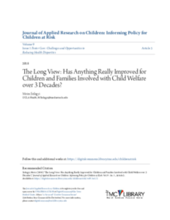Displaying 101 - 110 of 241
The current study examined family and community factors related to home visiting programme engagement in a sample of 1,024 mothers (primary caregivers, mean age 22.89 years) who participated in family support programmes funded through the US state of Georgia's Maternal, Infant, and Early Childhood Home Visiting programme.
This presentation describes the progress of the "Children and Young People in Out-of-Home Care Innovation Fund Integrated Care " project currently being undertaken by Children's Health Queensland.
This study explored stakeholder perceptions of barriers and facilitators to conversations about sexual health between foster/kinship caregivers and youth in foster care, with the goal of developing a brief, scalable sexual health training for caregivers.
The authors of this study sought to better understand the potential strengths and challenges of medical foster care (MFC) as a placement setting for children with chronic critical illness (CCI).
The objective of this study was to determine if the Power Through Choices (PTC) intervention can increase the use of birth control and reduce pregnancy among system-involved youths living in group care homes.
The aim of this study was to compare the health of 4- to 6-year-old children in out-of-home care (OOHC) in Southern Tasmania, Australia with their peers.
The Nurturing Care Framework provides a roadmap for action. It builds on state-of-the-art evidence about how early childhood development unfolds and how it can be improved by policies and interventions.
This paper reflects on: what’s better or not after 30 years; whether legislation and financing are aligned with child welfare’s goals of safety, permanency and well-being; and what remains to be done to improve the outcomes of children and youth in foster care or otherwise involved with child welfare.
The Community Opportunity Map is a tool that allows users to see localized indicators connected to community health and maltreatment prevention.
This paper presents the results of a national survey describing Maternal and child protection services (“PMI”) home visitation services and their local implantation in France.


